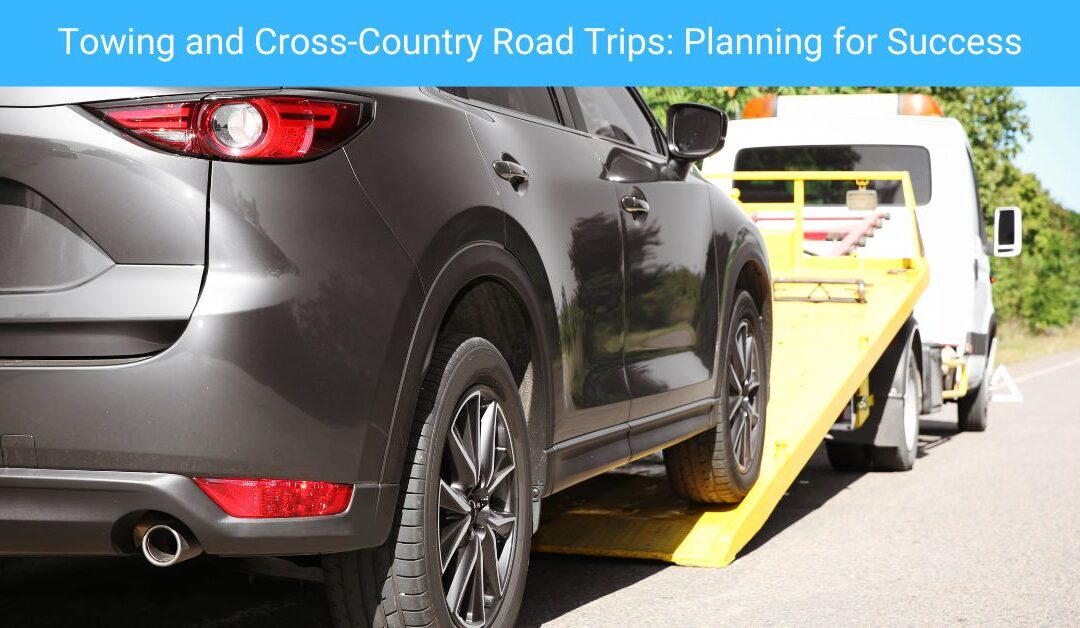A cross-country road trip is an exciting adventure, offering the freedom to explore new places and experience diverse landscapes. However, towing a vehicle or trailer on such a journey requires careful planning and preparation to ensure safety, comfort, and a smooth experience. Whether you’re towing a camper, a boat, or a vehicle, having the right strategies in place can make all the difference. This guide will help you plan a successful cross-country towing trip, ensuring that you’re ready for any challenges that may arise along the way.
Choosing the Right Tow Vehicle
The first step in planning for a successful cross-country road trip is ensuring that your tow vehicle is capable of handling the load you plan to carry. Towing capacity varies from one vehicle to another, and it’s crucial to know the exact weight of what you’ll be towing to avoid exceeding the vehicle’s limits. Overloading can lead to dangerous situations, such as engine strain, brake failure, and poor handling.
Before embarking on the trip, refer to the manufacturer’s specifications for your tow vehicle and ensure that the towing capacity aligns with the weight of your trailer or towed vehicle. In addition to towing capacity, consider the vehicle’s fuel economy, as towing can significantly impact your fuel consumption. A larger, more powerful vehicle may be necessary for long-distance towing, especially if you’re towing something like a large RV or a heavy boat.
Preparing Your Trailer or Towed Vehicle
Once you’ve confirmed that your tow vehicle is up to the task, the next step is to ensure that your trailer or towed vehicle is ready for the journey. Conducting a thorough inspection of the trailer is crucial to avoid issues on the road. Start by checking the tires, brakes, and suspension system to ensure they are in good working order. Worn tires, malfunctioning brakes, or suspension problems can quickly become safety hazards on a long trip.
If you’re towing a vehicle, ensure that it’s properly secured. Use the appropriate towing equipment, such as a tow dolly, car hauler, or flatbed trailer, depending on the vehicle you are towing. Ensure that all straps, chains, and connections are tightened properly to prevent any movement or damage to the vehicle during transit. It’s also important to confirm that your trailer or towed vehicle has the necessary lighting and signaling equipment to comply with road safety regulations.
Understanding the Route and Road Conditions
Planning your route is one of the most critical aspects of a successful cross-country road trip, especially when towing. Certain routes may have steep inclines, winding roads, or narrow paths that may be difficult to navigate with a trailer or large load. Research your route to avoid roads that might not be suitable for towing, such as certain mountain passes, bridges with weight restrictions, or areas with limited access for large vehicles.
You should also account for potential weather conditions, as extreme weather can pose significant challenges during your trip. Heavy rain, snow, or strong winds can affect your towing experience and make driving more dangerous. Be prepared for changing weather by monitoring forecasts and considering alternative routes if necessary.
Another key aspect of route planning is identifying rest stops, fuel stations, and towing service locations along the way. Towing can increase the frequency of fuel stops, so plan for refueling at regular intervals. If you’re towing a large vehicle or heavy load, it’s a good idea to map out rest areas or parking lots that can accommodate large trailers to allow for safe breaks and rest periods.
Vehicle Maintenance and Pre-Trip Inspections
Before hitting the road, perform a full inspection of both your tow vehicle and your trailer. It’s important to check the fluids in your tow vehicle, including engine oil, transmission fluid, and brake fluid. Ensure that the air filters, belts, and hoses are in good condition, as these can affect the vehicle’s performance over long distances. Verify that the lights, turn signals, and brake systems are working properly on both your tow vehicle and trailer. Brake lights and turn signals are essential for signaling your intentions to other drivers on the road, and malfunctioning lights can lead to accidents or even fines.
For your trailer, inspect the tires for wear and ensure they are properly inflated. Proper tire pressure is critical, especially when towing, as underinflated tires can lead to blowouts or poor handling. Inspect the brake system, particularly if your trailer is equipped with electric or hydraulic brakes. Check for any signs of damage or corrosion in the wiring and ensure that all components are functioning properly.
Packing Smart for the Journey
Packing for a cross-country towing trip requires careful consideration, as the extra weight from your trailer or towed vehicle limits how much you can carry. When packing your trailer or tow vehicle, prioritize essential items and avoid overloading. A heavy load can negatively affect your fuel efficiency, stability, and braking distance, making the journey more challenging and potentially dangerous.
If you’re towing a camper or RV, be mindful of the weight distribution inside the trailer. Proper weight distribution ensures stability while towing and reduces the risk of sway, which can be particularly dangerous on highways or during high winds. Use secure storage methods for any items inside the trailer to prevent them from shifting during transit, which could cause damage to both the cargo and the trailer.
Towing Etiquette and Safety Tips
Safety is paramount when towing a trailer or vehicle across long distances. When driving, always allow extra space between your vehicle and other cars to accommodate the longer stopping distance required when towing. Take turns more slowly and make wider turns to avoid damaging the trailer or towed vehicle. When passing other vehicles, ensure you have plenty of space to maneuver safely, and avoid making sudden lane changes that could cause instability.
Check your tire pressure and vehicle fluids regularly throughout the trip, especially if you’re driving for several hours at a time. Towing places additional strain on both the tow vehicle and the trailer, so it’s important to monitor their condition as you go.
If you’re traveling with a trailer or large load, keep your speed within the recommended limits for towing. Driving too fast can cause the trailer to sway or become unstable, especially in windy conditions. When driving through mountainous areas, reduce your speed to account for steep inclines and declines, which can put extra pressure on your brakes and transmission.
Emergency Preparedness and Roadside Assistance
While planning for a smooth trip is essential, it’s also important to be prepared for unexpected situations. Carry an emergency roadside kit that includes tools, a jack, a spare tire, and emergency lighting in case of a breakdown. Having a first aid kit, extra water, and a f
It’s also a good idea to have a roadside assistance service that specializes in towing. In the event of a breakdown or accident, a professional towing company can help quickly and safely resolve the issue. Having access to professional help gives you peace of mind, knowing that you’re not alone in case of an emergency.
Conclusion
Towing on a cross-country road trip can be an enjoyable and rewarding experience if you take the time to plan and prepare properly. By selecting the right tow vehicle, ensuring your trailer or towed vehicle is in good condition, and carefully planning your route, you can minimize the risks and make your journey more enjoyable. Regular maintenance, smart packing, and practicing safe towing techniques will help ensure a smooth and successful trip. With the right preparation, you can focus on the adventure and create lasting memories as you travel across the country.
If you are in Narre Warren, Victoria 3805, Australia, and looking for a car removal service, this is the best way to visit us.
Contact Us
Berwick Towing & Transport
27B William Rd
Berwick VIC 3806
(03) 7035 7815
www..berwick-towing.com.au/

